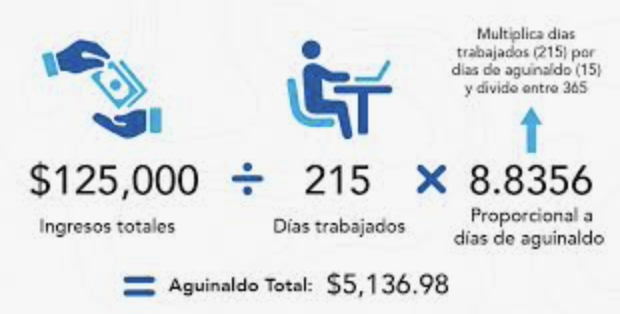Why it pays to review your 2025 year-end bonus today
Speaking as a labor attorney who litigates these cases every December: most “mistakes” in the year-end bonus aren’t mistakes, they’re repeat practices. And yes, the Federal Labor Law (article 87) is crystal clear: you’re entitled to at least 15 days of salary, and it must be paid no later than December 20. If you worked even one day this year, you’re owed the proportional part. Reviewing it today can mean recovering thousands of pesos that are yours by right.

How much you’re owed in 2025: the no-tricks formula
Integrated daily salary: the key place they shortchange you
It’s not calculated with “what your base pay says” on the stub, but with your integrated daily salary (SDI). SDI considers regular payments:
Includes: base pay, commissions, productivity bonuses, attendance/punctuality awards, regular tips, periodic cash or in-kind compensation.
Doesn’t include: PTU (profit sharing), grocery vouchers, savings fund, documented travel expenses, IMSS contributions.
Formula for a full year worked

Minimum year-end bonus = SDI × 15 days
Example:Average monthly income (base + variables): $15,000
Approx. SDI: 15,000/30=500
Minimum bonus: 500×15=7,500
Proportional formula if you started mid-year
Proportional bonus = (SDI × 15 ÷ 365) × days worked in 2025
Example:SDI: $420
Days worked: 210
Proportional bonus: (420×15÷365)×210=approx.3,615.07
Signs your employer is underpaying you
They calculated it with base pay only
If you divide your bonus by 15 and the result matches your daily base pay without commissions/bonuses, they likely omitted variables.
They paid you in vouchers or “bonuses”
Illegal. Payment must be in legal tender (cash or bank transfer). If they gave you cards or products, you can demand payment in money.
They paid it late
Deadline: December 20. As of the 21st there’s a breach. You can demand immediate payment, indexation, and interest.
You resigned and they told you you’re not entitled
False. Whether you resign or not, you’re owed the proportional amount for the days worked in the year.
What to do if they didn’t pay (or paid less)
Gather evidence now
Pay stubs and bank statements
Messages/emails where they inform payment
Contract, internal rules, or benefits policy
Witnesses of your schedule and duties
Your SDI and bonus calculation with backing
Try an internal written demand
Send a formal demand citing article 87 LFT and request payment within 5 business days. Keep proof of delivery/email.
Start mandatory conciliation
Since the labor reform, the first step is the Conciliation Center (local or federal, depending on the business). File your request with your evidence; many companies pay at this stage. If there’s no agreement, you’ll get a “no conciliation” certificate.
Sue before the labor court
With the certificate, file a claim before the competent Labor Court. Besides the bonus, you typically claim:
Differences for SDI calculation
Indexation and interest
Administrative fines (by the authority)
Related benefits if there are other omissions
PROFEDET provides free guidance and can assist throughout the process.
How much time you have to claim
The action to claim accrued benefits like the year-end bonus generally expires 1 year from the date it should have been paid. For historical differences and periodic benefits, consult an attorney to assess if you can claim up to 12 months per year and whether continuous employment allows accumulation. My professional advice: don’t wait; act in January if they didn’t pay in December.
Real firm cases: how much they recovered
Case 1: omitted commissions
Retail worker with base 8,500 and average commissions 3,500. Paid on base only. Recovered 3 fiscal years of differences with indexation: $14,200.
Case 2: late payment
Bonus of 10,200 deposited December 28. Claimed lateness and SDI differences. Total recovered : an extra 3,100.
Case 3: resignation in November
Employee resigned November 10. Proportional bonus denied. Successful conciliation in 15 days: $4,800 plus letter of recommendation.
Mistakes that can cost you the case
Signing “in full agreement” without reviewing
Never sign that you agree if you see differences. Add “received, not in agreement” and keep a copy.
Not documenting variables
Keep evidence of commissions/bonuses (reports, emails, targets). Without documentation, the company will claim they aren’t regular.
Letting the deadline pass
Time works against you. Schedule conciliation as soon as you see noncompliance.
How to compute your SDI fast
Practical monthly method
Add your monthly base salary + the average of variables from the last 3 to 12 months (use the period that favors you and you can prove).
Divide by 30 to obtain an approximate SDI.
Note: The official IMSS SDI may differ due to caps and the nature of benefits; for the bonus, prioritize the regularity and consistency of variable payments that are part of salary.
Attorney’s conclusion
Your year-end bonus isn’t negotiable and it isn’t a “nice holiday detail.” It’s a minimum right. If your company complies, great; if not, there’s a clear path: correct calculation, internal demand, conciliation and, if necessary, a lawsuit. In my experience, when you bring clean numbers and evidence, most employers pay before trial. Do your math today; if there are differences, don’t leave them on the table.
